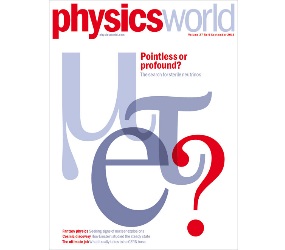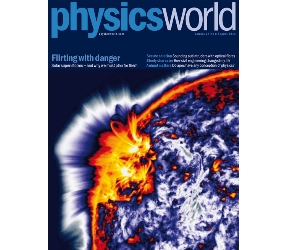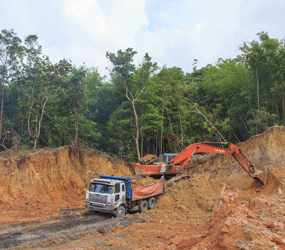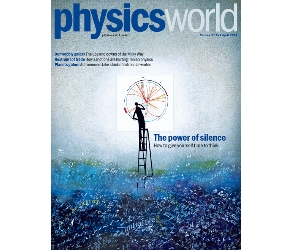2014
-

"Smart material" chin strap harvests energy from chewing
A chin strap that can harvest energy from jaw movements has been created by a group of researchers in Canada. It is hoped that the device can generate electricity from eating, chewing and talking, and power a number of small-scale implantable or wearable electronic devices, such as hearing aids, cochlear implants, electronic hearing protectors and […]
-

Graphene gets a 'cousin' in the shape of germanene
A team of European researchers has become one of the first groups to successfully synthesize the 2D material germanene. Dubbed a ‘cousin of graphene’, the material, which is made up of just a single layer of germanium atoms, is expected to exhibit impressive electrical and optical properties and could be widely integrated across the electronics […]
-

In September's Physics World: Scientists get set for simulated nuclear inspection
Some 40 scientists and technicians from around the world will descend on Jordan in November to take part in a simulated on-site inspection of a suspected nuclear test site on the banks of the Dead Sea. Playing the part of inspectors, the experts will have access to a wide range of sensor technologies to look […]
-

August's Physics World: Scientist underlines threat of "solar super-storm"
In this month’s issue of Physics World, Ashley Dale from the University of Bristol warns of the “catastrophic” and “long-lasting” impacts of “solar super-storms” and the dangers we face if the threat continues to go unnoticed. Dale, who was a member of an international task force – dubbed SolarMAX – set up to identify the […]
-

"Land grabbing" could help feed at least 300 million people, study suggests
Crops grown on “land-grabbed” areas in developing countries could have the potential to feed an extra 100 million people worldwide, a new study has shown. The improved infrastructure brought about by foreign investment could increase the productivity of subsistence farmlands in countries such as Indonesia and Papua New Guinea and could mean these lands can […]
-

In May's Physics World: The pitch drops that got the world talking
In light of recent results from the “world’s longest experiment”, spanning more than 90 years, at the University of Queensland, a group of researchers from Trinity College Dublin explain the background behind their own pitch-drop experiment in this month’s Physics World and offer an explanation as to why their research hit the headlines in 2013. […]
-

"RoboClam" hits new depths as robotic digger
A digging robot inspired by the unique mechanisms employed by the Atlantic razor clam has been created by a group of researchers in the US. The robot, dubbed RoboClam, is able to dig with extreme efficiency by transforming the surrounding soil from a solid into a liquid, and could have a variety of applications from […]
-

April's Physics World: Should physicists work to the sound of silence?
In this month’s issue of Physics World, Felicity Mellor, a senior lecturer in science communication at Imperial College London, questions whether the requirement of the modern physicist to collaborate and communicate is preventing the intellectual progress brought about by silence and solitude. Drawing on the approaches of Newton, Einstein, Cavendish and Dirac, Mellor highlights the […]







